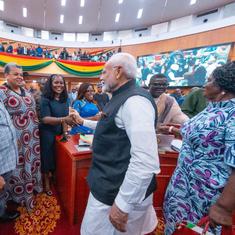The flames from the Pakistan Muslim League (N) and Pakistan Tehreek-e-Insaf’s political war are now consuming all branches of the state, pushing the country towards unprecedented chaos.
The judiciary has become the latest battleground between the two factions, with senior justices, whether they realise it or not, now being seen as pieces on a chessboard, to be moved or removed as the players see fit.
More salvos have been fired from London and Lahore, with Pakistan Muslim League (N) supremo Nawaz Sharif blaming the apex court for all of the country’s troubles post-2017, and the Pakistan Tehreek-e-Insaf chief accusing his rival party of “threatening” the Supreme Court along the lines of what it did in 1997 to silence former Chief Justice Sajjad Ali Shah. Both sides have exhorted their supporters to “come out” and “take a stand” in their favour, increasing fears of clashes on the streets.
The incumbent government and its sympathisers are spinning their sudden interest in the Supreme Court’s affairs as a long overdue effort to reform its “practices and procedures”.
It is increasingly looking like a very thin façade. There has been a parallel, ongoing effort to paint certain judges as being “sympathetic” to Imran Khan and the Pakistan Tehreek-e-Insaf, which has been countered dutifully by the latter’s supporters with attacks against judges being seen as “sympathetic” to the Pakistan Muslim League (N).
This war of words has taken an increasingly ugly form, and there are now open attacks on even the families of sitting and retired Supreme Court justices, who are accused of influencing court decisions with their personal political preferences.
It may be noted that recently published remarks attributed to retired Army Chief General Bajwa, in which he insinuated that the country’s top judges are swayed in their decisions by their spouses’ sympathies for the Pakistan Tehreek-e-Insaf chief, are what seem to have triggered this line of commentary.
While Nawaz Sharif and the Pakistan Muslim League (N) may rightly feel they were hard done by, by the top court with its judgements in 2017, sitting abroad and bringing the judiciary’s integrity into question with insinuations of its partiality is not the solution. With the Pakistan Muslim League (N) in government, Sharif can return to the country and make his case from here.
But he must realise that even if his party’s efforts are somehow successful in securing him a clean chit from the courts while he remains abroad, he will still need to return to the people of Pakistan if he wishes to rule this country again.
He cannot expect their sympathies to change overnight, given the crude manner in which his government keeps trying to assert itself.
It defies understanding how the Pakistan Muslim League (N) expects public vindication if it is blocking the electoral process, resorting to state high-handedness, failing in economic management and upending the Constitution while trying to achieve it.
This article first appeared in Dawn.










